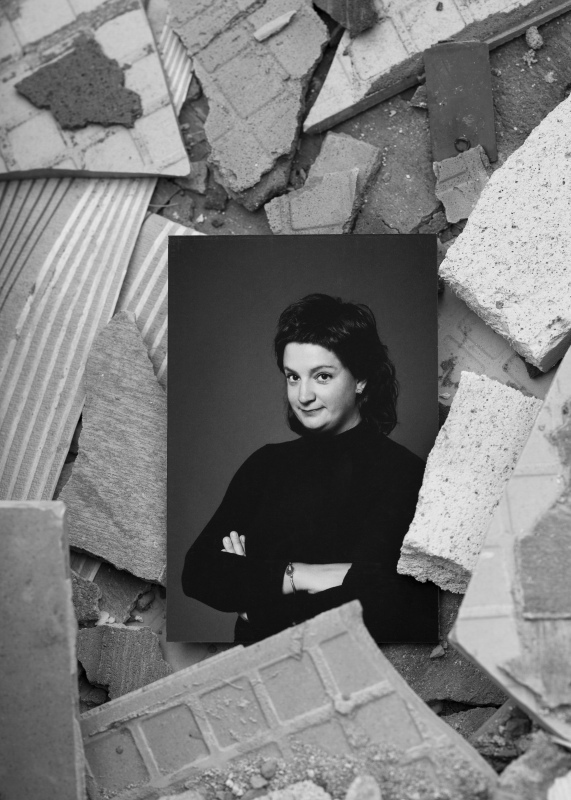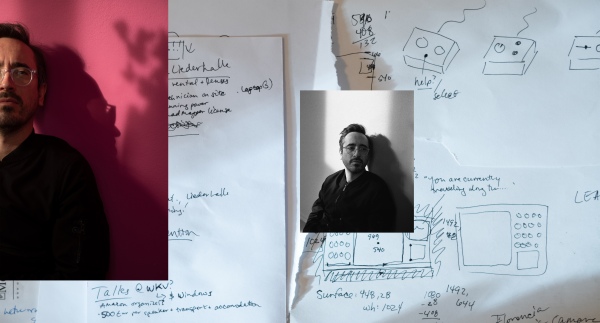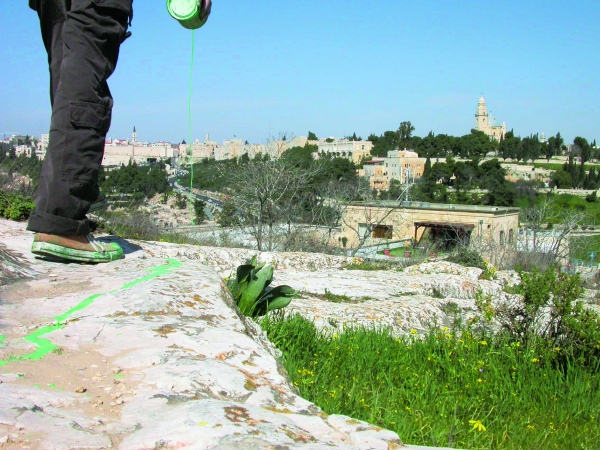A war that isn’t a war
Jaśmina Wójcik in conversation with Bogna Świątkowska
-
Bogna Świątkowska: Going to Palestine, were you prepared for what you’d see there in terms of the political, social, or economic situation?
- Jaśmina Wójcik: No. With a year’s hindsight, I think it was a borderline experience in my life. Definitely. Most powerful, but also most beautiful, in a way. If you can speak about beauty here at all. That experience was full of contradictions. There was a sense of despair caused by seeing what’s happening there, how the Palestinians are treated by the Israeli authorities and military, and how little the outside world is aware about it, despite all that has been said and written about the conflict in the Middle East. I saw a war that isn’t a war. It’s a constantly encroaching occupation. It’s a bit like slipping into madness. Before my grandmother got ill, I thought illness was something that just happened. In fact it creeps up on you with tiny steps. And here war does that, with tiny steps that are terribly radical, that stop at nothing. I still don’t understand it. I used to live in Kazimierz, and the history of Jews or Israelis was important for me, dramatic, horrible. Jan Tomasz Gross’s books made me feel bad as a Pole. I wanted to do something about the fact that we as Poles didn’t behave towards the Jews as we should have. And there I saw that they’d become an aggressor themselves. I started digging in that to understand how the victim becomes the oppressor.
-
Before entering Palestinian territory, at Israeli military checkpoints, the visitor sees large signs warning that you enter at your own risk, which may potentially be fatal. A message in three languages that you are entering an area where people will be trying to kill you. After crossing the border, you realise you are in community of people facing immense challenges of daily life caused by the occupation, limited by a political situation that you can hardly compass, can hardly grasp all the paradoxes and historical feuds. The Qalandiya Biennale 2018, which you participated in, was dedicated to contesting prejudices and stereotypes, amongst other goals.
- The Biennale was an incredible experience because I was able to be inside. I didn’t feel like a tourist. I’m always interested in people, in how they live, how they talk about themselves and the ways of preserving their heritage. I’m interested in small yet powerful saving gestures that open our eyes. You begin to notice buildings, people, their self-organisation. If you’re on a tourist orbit, you don’t see that at all.
-
In Ramallah you were supposed to do a project that would be inspired by the city. Besides that, it could be any theme. How did the process look like? You encountered a whole lot of things that could be inspiring for you as an artist and as a human being. How did you decide to team up with Mohammad Saleh?
- I work in tandem with cameraman Jakub “Kuba” Wróblewski, and we were meeting all kinds of people and groups. Doing research not only in Ramallah, but also in Jerusalem. But up until that point it was, well, not that it didn’t touch me, but it didn’t click in the special way, when I’d have said, oh, this makes sense for me, this is what I want to focus on. Meeting Mohammad in Bethlehem, after running away from the crowds for a couple of hours, after visiting a museum fashioned by Banksy, was something that clicked.
-
You are referring to the famous Walled Off Hotel, which is a proper hotel and at the same time the object of a critical artistic statement which uses the language of aesthetics to draw attention to Israel’s violations of human rights and international treaties in Palestine. What does this museum hold?
- A history of the Wall. And a living history at that: testimonies made by Palestinians about the occupation, about the construction of the Wall. There are stories there of people who actually had to build the wall themselves as that’s how they were earning their living. There is also the film 5 Broken Cameras, which I knew, and which tells the story of the Israeli military’s lawless violence against the Palestinian village of Bil’in and its residents. After visiting the museum we went to meet Mohammad in a quiet neighbourhood in Bethlehem. Very beautiful area, no tourists at all. Mohammad showed us his container garden in repurposed metal barrels. He told us us there was an alley nearby that people used as a loo, and that he’d use the urea from there as fertiliser. He also showed us a small shop which among other things carried a selection of Palestinian seeds. He told us about how they swap those seeds, how they smuggle them abroad since Israel has penalised the possession of plants that are traditional Palestinian spices. And he was a man who spoke with all his body: about plants, about how important gardening and its educational potential are, about how he builds gardens with scraps and refuse, with compost that he produces himself. This wasn’t urban gardening as we know it; it was a mix of permaculture and, how to say it, some kind of post-punk. Plus the social idea – he also talked about children’s workshops – which seemed absolutely crucial to me. In the face of all that I realised that proposing my own thing, whatever it would be, wouldn’t make sense. The best I could do was to support what I’d seen there through him, what I’d encountered there. To support it with such tools that I use, and in a way in which I can do it.
-
Can you describe the Palestinian landscape? The omnipresence of plastic waste that litters both town and country – did that contribute to your decision?
- In terms of what’s in the shops, it’s like in the West. People buy fridges, freezers, microwaves, take mortgage loans, drive news cars. Capitalism and consumerism in full swing. Plus the omnipresent garbage. Here in Poland, I think, we’re slowly turning away from plastic, and the awareness that alternatives are possible is growing. And there it doesn’t look like this process has started yet. Well, perhaps in niche eco cafés.
- The landscape that I saw is absolutely mystical. And it is torn apart, or killed actually, by settlements that the Israelis build on those hills. Not at their foot, but right on the hilltops. For me, that’s a terrible violation, a violation of nature, of the landscape.
-
The development of new settlements is of strategic importance, as defined by one of the most famous Israeli military commanders, Ariel Sharon. He has gone down in history as the author of many non-standard ideas about how to make life nasty for those Palestinians who haven’t left their territories yet.
- That’s right. The proliferating settlements rob the Palestinians of their land. They burn their olive groves. That was horrible for me. There’s nothing you can do about it, no way to prevent it. I felt an analogy with Poland here, with a large-scale destruction of nature through decisions made somewhere high up. That’s why the only situation I believe in is totally grassroots micro-action geared towards rhizoming. The upside then is that others too work on such a micro-scale, and the joint action grows naturally as like-minded people meet. That’s why I saw that Mohammad was a positivistic idealist, doing such grassroots work. His car has been adapted for the purpose, with shelves for everything and so on. If he finds a large barrel, he sets up a garden in it. Plus it’s a barrel on wheels, for he has found and repaired a pushcart, and turned the barrel into a vehicle. In our film, he appears as a gardener with a compact-size mobile garden that you can take anywhere, which provides both food and shade. So amid all the madness and helplessness of the Palestinian reality, Mohammad was like a gift for me. A bird of hope. The things he does are so important and necessary that I simply had to support him.
-
What can be noticed in your work is a focus on the individual, on a single figure who stubbornly builds something that may become a model to follow for the community. But it doesn’t have to. It’s absolutely not clear how the situation in Palestine is going to be shaping up in the near term. You have a very strong inner compass oriented to the local community and how it reacts to artistic activities. How was it this time, in Palestine?
- Our work wasn’t just an appeal: make gardens for yourselves, it’s going to be fun. It was a specific proposition, a response to the way the Israelis discriminate against the Palestinians by restricting their access to water and certain foods, which go to Palestine, but are controlled by Israel. The idea of setting up gardens, which, firstly, can survive for a very long time without water and, secondly, feed you, therefore offering independence, is a political proposition, one able to positively transform their space without spending money. That’s why for the video with Mohammad we simply walked around Ramallah, picking up what we found in the streets. It shows that with a little a bit of know-how and effort, the stuff lying around can, indeed, provide nourishment and shadow. That aspect was very important. It wasn’t so that we came and said, come on, we’re going to do a gardening workshop, relax and so on. The idea was different altogether: those videos were meant as educational materials. They are online in Arabic, with English subtitles. Palestinians use smartphones, so watching these video tutorials isn’t a problem for them. In all this hopelessness I thought this would make sense. I wanted our input as artists to matter, to be more than just white-cube art. Of course, places such as the Palestinian Museum are beautiful and important, but few people get there. Although there is something tempting in the idea of making gallery-goers realise that it’s also possible to go this way.
-
In Palestine, these alternative ways of functioning are not about practicing a progressive lifestyle, but rather a result of oppression, shortages, and restrictions. It has been inspired by a conflict that has been wreaking havoc in people’s lives for decades. Your artistic practices are based on a close relationship with the local community, on communication built on trust. How was talking to people in Palestine like?
- That’s a tough question to answer. For example, when you go to Hebron, a divided city, the people there have something genuine and authentic about them. They are open and cordial. Your presence makes them want to tell their story. Once we were sitting with Kuba by the city hall. A family with three kids was passing by. Knowing they were religious, I remembered not to establish eye contact, not to appear conspicuous, even though I attracted attention with my very looks. Those kids were watching us very closely. I saw them starting to whisper something into their parents’ ears, and I thought, oh-ho, we’re probably have to leave. And then the kids came to us, one after the other, and said with a smile, “Welcome!” They shook our hands. And I simply started crying. I sat there, looking and them and thinking, God, how biased I am. Those clichés from Poland playing out in my head, I imagined that just because they were religious they’d be xenophobic. And those kids simply welcomed us.
-
Your collaboration with Mohammad has continued. How is it going?
- It’s working on similar energies. A collaboration style I believe in. Either there is chemistry or there isn’t in which case it doesn’t make sense to continue, for it won’t come to anything anyway. With Mohammad, the energy was there from the beginning. We left Palestine, me and Kuba, with a sense of parting for a while only. And indeed! It’s happened. We’ll be doing a film together, a full-length documentary about Cairo’s Zabbaleen, the garbage people, who collect refuse in this sprawling metropolis.
-
You told me it was hard leaving Ramallah. Your most important lesson from Palestine?
- I’m very careful now to avoid hate speech, even in moments of total outrage at what’s going on. To avoid radicalizing myself, aggravating, to look for ways to communicate instead. After I’ve seen from up close, in daily life, how the Israeli-Palestinian conflicts impacts on ordinary people, I know that scission and radicalisation are the most tragic things. It’s terrible when unbridled hatred spills out, when it’s allowed to spill out, no matter where this happens.
- Translated by
- Marcin Wawrzyńczak


